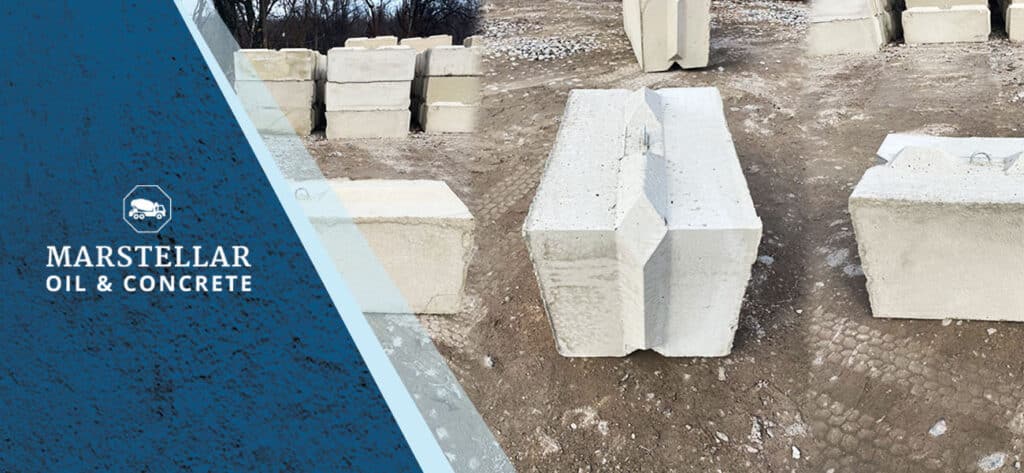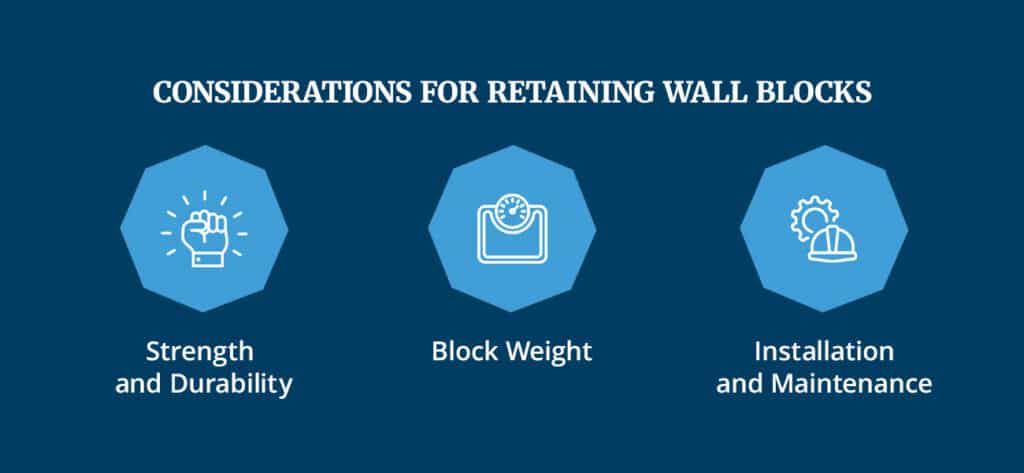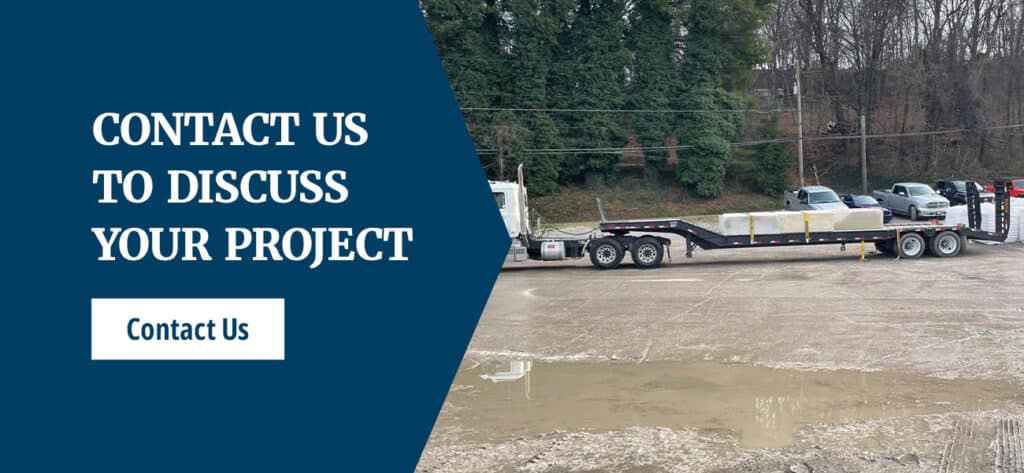
Concrete retaining wall blocks are specialized building materials with specific functions, which is why they’re better suited to certain jobs than other concrete products. Here, we explore how you can best use these blocks in construction, landscaping, traffic management and other retaining wall applications.
What Are Retaining Wall Blocks?
Concrete retainer wall blocks are slabs of concrete specially designed for simple, durable wall construction. They go by many names, including but not limited to:
- Bin blocks
- Waste blocks
- Bunker blocks
- Gravity wall blocks
- Barrier blocks
- Mafia blocks
Here are some of the most important retaining wall block characteristics:
- Features: Bin blocks feature a rebar handle and an interlocking design, which makes them easy to move and stack using skid steers, cranes and other heavy machinery. As a result, they’re ideal for building vertical structures like retaining walls.
- Composition: Recycled concrete aggregate (RCA) is one of the primary materials used to make concrete bin blocks. It contains fine grains of sand, pebbles and other aggregates, which makes it exceptionally durable.
- Compression strength: Concrete blocks for retaining walls have a high tensile strength, which means you can use them to build larger structures without sacrificing quality or durability.
Retaining Block Walls vs. Freestanding Walls
While retaining walls serve as functional support for other structures and environmental features, freestanding walls are primarily aesthetic in purpose. Gardeners and landscapers often incorporate freestanding walls into their designs to:
- Break up open spaces.
- Divide landscapes according to zones.
- Add a visual accent to an area.
Unlike retaining walls, freestanding walls are best suited to flat surfaces, where they do not need to support soil or other structures.
While builders can make both types of walls out of concrete blocks, they can also use other materials like cast-in-place (CIP) concrete. However, retaining wall blocks are often the most long-lasting option.
Cast-In-Place Walls vs. Block Walls
Retaining block walls are a popular type of retaining wall due to their simple construction and low maintenance requirements. The blocks’ heavy, durable composition allows them to withstand larger loads — and thanks to their interlocking design, you can take the wall down and move it more easily.
Another way to build a retaining wall is by using wet concrete for a CIP wall. A CIP wall arrives at your site as wet concrete, usually in a cement mixing truck. The operator will pour the cement into the wall mold and allow it to set, which can take anywhere from a few days to a few weeks.
Although CIP walls are still a common choice, they’re often more costly and less durable than block walls due to their tendency to wear out more quickly.

Considerations for Retaining Wall Blocks
Sourcing high-quality materials is a key part of building excellent structures that last. Here are some of the most important considerations to make when planning a retaining concrete wall project:
Strength and Durability
Concrete has a high tensile strength, which is why it’s a good material for retaining walls and other heavy-duty applications such as:
- Highway barriers
- Tie-down weights
- Loose material storage bins
- Traffic diversion
- Protective barriers
However, harsh environmental conditions and severe weather can put extra strain on the concrete, impacting its durability. Waterproofing your blocks with a protective coating is a good way to prevent cracking and other damage that can result from storms and other inclement weather events.
Block Weight
A concrete block’s weight is another important consideration when designing a retaining wall. This number is necessary for calculating various technical attributes, including:
- Seismic base shear force: Base force is a measure of the maximum lateral force a concrete wall block can withstand as a result of seismic activity.
- Heat capacity: Also known as thermal mass, heat capacity is a measure of the amount of heat a block can absorb and hold.
- Gravity loads: Also called wall dead load, the gravity load is the maximum vertical force a block can withstand. It should be the first vertical load considered, as it directly impacts the size of your retaining wall.
- Sound transmission class (STC) ratings: This rating indicates a retaining wall block’s capacity for sound insulation. Typically, heavier blocks have higher STC ratings than lighter ones.
Installation and Maintenance
Thanks to their interlocking design, retaining wall blocks are easy to install. You simply need to ensure you have the right equipment on hand to construct the wall, which can include:
- Skid loaders
- Cranes
- Excavators
- Transit levels
- Shovels
- Hand and eye protection
Although concrete is a fairly low-maintenance material, taking good care of your retaining wall can help extend its life span and reduce potential repair costs in the future.
Some important maintenance tips include:
- Conduct regular inspections: A visual inspection once every few months can help you ensure your wall is in good condition for many years to come. Frequent inspection is especially important during the winter months when snow and ice can cause cracks to form in the concrete.
- Clear drainage pipes: Make sure the drainage pipes are free of any blockages to prevent water runoff from pooling at the base of the wall.
- Refill eroded areas: If you notice any depressions in and around your wall, it’s important to refill these with new concrete as quickly as possible.
Why Choose Retaining Wall Blocks From Marstellar Oil and Concrete?
When you’re beginning a new construction project, you need to ensure you’re working with the best materials available. That’s especially important when it comes to support structures like retaining walls.
Looking for a reliable supplier for concrete wall blocks in Central Pennsylvania? Here are some of the reasons why you should choose us:
Sustainability
We make our retaining wall blocks out of recycled concrete from construction sites, which helps reduce construction waste and emissions from manufacturing new concrete.
Plus, because carbon dioxide absorption naturally strengthens structures made from recycled concrete, our block walls can help your structures last longer and reduce your organization’s carbon footprint.
Reliable Supplier
We’ve been delivering high-quality concrete products to businesses throughout Central Pennsylvania since 1998, so you can count on our expert team to produce the best materials for your project. Just give us a call for more information about our retaining wall blocks or any of our other concrete products.
Fast and Efficient Delivery
When you purchase bin blocks from us, we can deliver them right to your job site to save you valuable time and energy. And if you need ready-mix concrete to supplement your blocks, we can supply that, too. All your team has to do is unload your materials and install your wall.

Contact Us to Discuss Your Project
At Marstellar Oil and Concrete, we’re dedicated to providing Central Pennsylvania businesses with the materials they need to create affordable, functional structures that last. We have two sizes of concrete blocks for sale — 2x2x3 at 1,800 pounds and 2x2x6 at 3,500 pounds — so you have options to suit your unique project.
Our office is here to help you. Contact us online or call us at 717-834-6200 to get started.


